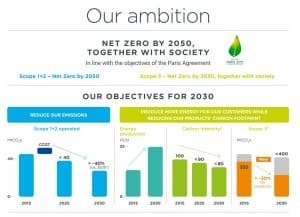Two of the world’s largest oil companies, ExxonMobil and TotalEnergies, are in the spotlight for very different reasons. Exxon is fighting new climate-reporting laws in California. Meanwhile, TotalEnergies was found guilty of greenwashing or misleading the public about its climate claims. These changes show the rising tension among fossil fuel producers, governments, and regulators as climate rules get stricter around the world.
ExxonMobil Takes California to Court Over Climate Rules
ExxonMobil filed a lawsuit to block California’s new climate-reporting requirements. The company claims the laws breach its constitutional rights, particularly its First Amendment free speech rights. It also says they unfairly target large businesses in the state.
The case focuses on two key laws:
- Senate Bill 253 requires companies that make over $1 billion a year to report their greenhouse gas emissions. This includes indirect “Scope 3” emissions.
- Senate Bill 261 requires companies to share how climate risks might impact their finances and operations.
Exxon says the laws force companies to “speak” in a way that aligns with California’s view on climate change. The oil giant says the regulations will bring high costs and unreliable data. Also, tracking emissions in global supply chains is tricky.
California officials, however, say the lawsuit is an attempt to avoid transparency. They argue that companies must be open about the full impact of their activities if the world is to meet climate goals.
If the court sides with Exxon, the decision could delay the rollout of similar laws in other U.S. states. But if California wins, it would mark one of the most ambitious climate-reporting mandates in the world.
TotalEnergies Faces Penalty for Misleading Climate Claims
In France, TotalEnergies faced a very different kind of scrutiny. A Paris court decided on October 23 that the company misled consumers with its public statements about climate goals.
The court decided that TotalEnergies’ 2021 marketing messages were misleading under its greenwashing laws. They claimed to be “a major actor in the energy transition” and aimed for net zero by 2050. However, the court noted the company’s ongoing investment in oil and gas projects.

As a result, TotalEnergies must remove or revise the disputed statements from its website within one month or face daily fines of up to €20,000. The company was also ordered to pay damages and legal fees to three environmental groups that filed the lawsuit.
TotalEnergies accepted the ruling. However, it noted that most claims by the plaintiffs were dismissed. The company also insisted that its low-carbon investments are real.
The TotalEnergies case marks one of the first successful “greenwashing” rulings in Europe against a major fossil fuel producer. It sends a clear message: companies must align their advertising with measurable action, not just promises.
A Global Shift Toward Accountability
The twin cases reveal a major shift in how governments and courts are handling corporate climate claims. Oil and gas companies have pushed for long-term net-zero goals for years. Yet, they keep expanding fossil fuel production. That approach is now under heavy scrutiny.
Across the world, regulators are moving from voluntary to mandatory climate reporting. Investors and consumers are also demanding more proof that companies are reducing emissions in real terms, not just on paper.
The International Energy Agency (IEA) reports that the global oil and gas industry accounts for about 15% of total energy-related emissions. This includes methane leaks and refining. The IEA says these emissions must fall by at least 60% by 2030 to stay on track for net-zero goals.
But progress remains slow. In 2024, the biggest oil companies put over $400 billion into new fossil fuel projects. In contrast, they invested less than $80 billion in renewables. This imbalance fuels criticism that public climate statements often do not match actual spending.

Why Climate Disclosure Laws Are Game-Changers
Transparent emissions reporting is a critical step toward accountability. California laws in Exxon’s lawsuit require big companies to report their total emissions. This includes emissions from direct operations, supply chains, and product use.
Supporters say these rules will:
- Create a level playing field for all large firms.
- Help investors and consumers compare climate performance.
- Push companies to reduce emissions more aggressively.
For example, Scope 3 emissions, those from customers using a company’s products, often make up more than 80% of an oil company’s carbon footprint. Without such disclosures, the true impact of fossil fuels remains hidden.
Opponents, however, say the costs and technical challenges could be high. They warn that requiring thousands of global companies to track every step of their carbon footprint could lead to inconsistent or unverifiable results.
Still, many analysts believe the trend toward mandatory disclosure is irreversible. Similar frameworks are being considered in the European Union, Japan, and Canada.
Rising Legal and Market Risks for Oil Majors
The cases involving ExxonMobil and TotalEnergies are part of a growing wave of climate-related lawsuits. The Grantham Research Institute reports that almost 3,000 climate cases have been filed globally. About 230 of these focus directly on companies.
Many involve accusations of greenwashing, misleading investors, or failing to disclose climate-related financial risks.
The potential costs are high. Penalties, legal fees, and damaged reputation can all hurt a company’s market value. For investors, it adds a new layer of risk in an already volatile energy sector.
Meanwhile, clean energy investment continues to rise. BloombergNEF estimates that in 2024, spending reached over $2 trillion. This includes renewable energy, electric vehicles, and carbon capture technology. This is more than double what was invested in fossil fuels.
This global capital shift pressures oil companies. They need to show they are adapting to the energy transition, not resisting it.
The Bigger Picture: Transition or Tension?
These two high-profile cases capture a crossroads moment for the oil industry. Governments aim for quicker decarbonization. However, companies still depend on fossil fuels for profit.
ExxonMobil’s lawsuit represents resistance — a pushback against state regulation. TotalEnergies’ court case shows what happens when public messaging gets ahead of actual progress.
Yet, both cases show that climate accountability is no longer optional. The industry is under pressure to show clear results. This comes from courts, disclosure laws, and investors.
To stay competitive, oil majors must boost low-carbon investments. They should also improve transparency and align operations with credible climate targets.
If Exxon loses its challenge, it could open the door to a wave of state and federal disclosure rules in the U.S. If more courts follow France’s lead, companies could face lawsuits for greenwashing worldwide.
Either way, fossil fuel companies are under pressure to back their climate claims with action. The age of unchecked promises is ending, replaced by a future of measured accountability.
- READ MORE: How Princeton’s Break with BP Exposed the Hidden Influence of Fossil Fuel Money on Universities
The post Oil Giants Under Fire: ExxonMobil Fights Climate Laws as TotalEnergies Found Guilty of Greenwashing appeared first on Carbon Credits.















